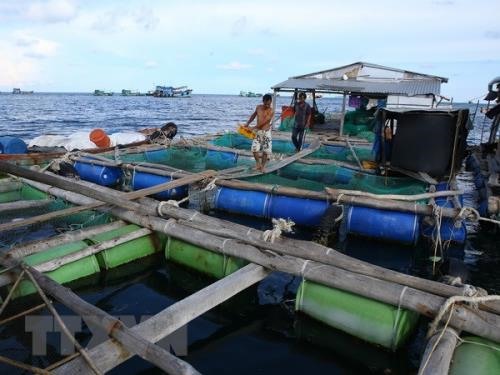 Society
Society

The coastal provinces of Ninh Thuận, Bình Thuận and Bà Rịa – Vũng Tàu have grown their aquaculture to an industrial scale and farm a large variety of species.
 |
| Breeding aquatic creatures in floating cages at sea in the south-central province of Bình Thuận. – VNA/VNS Photo |
HCM CITY — The coastal provinces of Ninh Thuận, Bình Thuận and Bà Rịa – Vũng Tàu have grown their aquaculture to an industrial scale and currently farm a large variety of species.
The three, among the country’s most important fisheries provinces, have a combined coastline of 450km and a number of rivers and lakes suitable for aquaculture.
Quỳnh Quang Huy, head of the Bình Thuận Province Fishery Sub-department, said thanks to favourable natural conditions such as climate and good quality water, the province enjoys great advantage in the production of shrimp seeds (black-tiger shrimp and white-legged shrimp).
Seed production is done in a concentrated manner and on a large scale, he said.
The province has 135 enterprises and other industrial-scale establishments that produced nearly 25 billion hatchlings last year.
Mai Kiều, director of the province’s Department of Agriculture and Rural Development, said the department has developed models for breeding shrimp based on Vietnamese good agricultural practice (VietGAP) standards.
It also organises training courses on VietGAP standards for shrimp farmers, he said.
Nguyễn Văn Lâm, a farmer in La Gi Town who adopted one such model two years ago, said it enables high yields since the survival rate of shrimp is more than 90 per cent.
“The average profit is twice as from traditional farming methods.”
Bình Thuận has set a target of aquaculture accounting for more than 30 per cent of its total fisheries value by 2020.
It has 900ha of shrimp farms with an average annual yield of 9 -10 tonnes per hectare.
Farmers also raise various kinds of freshwater fishes like marble goby, tilapia and bronze featherback on an area of 1,800ha. Last year they harvested more than 5,500 tonnes.
Farmers in the province also breed various kinds of marine fishes such as grouper and cobia and lobster in floating cages.
In neighbouring Ninh Thuận Province, farmers have developed concentrated shrimp farming areas based on VietGAP standards, according to the provincial Department of Agriculture and Rural Development.
The province, the country’s largest shrimp seed producer, produces more than 30 billion shrimp hatchlings a year, mostly black-tiger shrimp and white-legged shrimp, which meets 30 per cent of the country’s demand.
It plans to have 2,300 – 2,500ha of aquaculture farms and supply 36 billion hatchlings by 2020.
In Bà Rịa – Vũng Tàu, many farmers breed shrimp and other aquatic species to VietGAP standards.
Nguyễn Đăng Nhân, who has had a 12ha white-legged shrimp farm in Xuyên Mộc District for five years, said he harvests three shrimp crops and a total of around 20 tonnes per hectare per year.
His VietGAP-quality shrimps sell at higher prices and have steady demand, he said.
Traders pay VNĐ3,000-5,000 (US$0.12- 0.21) more per kilogramme for them than for traditionally farmed shrimp, he said.
Trần Văn Cường, director of the Bà Rịa – Vũng Tàu Department of Agriculture and Rural Development, said besides fishing at sea, the province also has large areas for breeding aquatic species in the Thị Vải, Dinh, Ray and Đu Đủ rivers and Đá Đen, Sông Ray and Châu Pha lakes.
It has zoned more than 16,100ha for breeding aquatic creatures in floating cages, ponds and lagoons, he said.
Its aquaculture development plan envisages raising 80 per cent of the creatures to VietGAP standards by 2020.
It will apply advanced techniques to increase yield and ensure food safety.
Cường said to meet the targets the province would step up investment in infrastructure in areas where aquaculture is concentrated.
Aquaculture has helped turn fallow lands in Bà Rịa – Vũng Tàu into areas that produce high-value aquatic species, and become one of the province’s important fields in recent years.
Its aquaculture has shifted from the extensive farming model to advanced extensive farming, semi-industrial farming and industrial farming models, according to its Fishery Sub-department. — VNS




